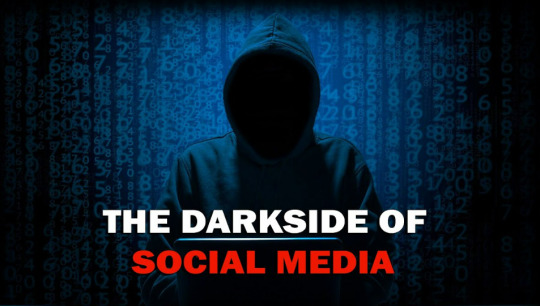#echo chambers
Explore tagged Tumblr posts
Text
This is hilarious: an epicly-overconfident Kamala-supporting "political analyst" prematurely celebrates a Democrat victory by purchasing champagne on election night and lecturing a man. Did it ever get drunk?
Best comment:

72 notes
·
View notes
Text
instagram
This is a very compelling and disturbing experiment by an instagram user, who found that Instagram is showing very different top comments to different people, and that this difference ends up strongly reinforcing confirmation bias, creating an "echo chamber" effect.
I.e. the algorithm shows people more of what they already agree with.
This has many negative effects:
it causes polarization, dividing people into different camps in particular issues.
It tends to reinforce people's beliefs rather than challenging them.
It makes people less empathetic when talking to people who hold different views from ours, because we wrongly assume that they have been exposed to certain ideas or perspectives because we see those things voiced frequently, but they may have never seen them at all.
I find this super creepy. I want to start or join a campaign to force Social Media companies to do this. We can do this through regulation, i.e. we can pass a law forcing companies to allow users the choice of whether or not to sort comments in this way, and we could make the law require users to opt-in, so make it so that the comments would default to showing in the same order for all users. There are many different options. Another thing that I would like would be requiring social media companies to explicitly say right above the comments, whenever the order of the comments has been personalized.
These laws would be great for small companies because it takes active effort and resources to personalize comments, so by default, smaller companies probably don't do it. I.e. not doing it is the path of least resistance so this would not be placing an unusual burden on smaller, newer, and less-well-funded social media companies.
12 notes
·
View notes
Text
It’s only an 11 min listen linked but to summarize:
•we’re pretty much never changing people’s minds who don’t agree with us
•we’re in echo chambers of feedback for what we already believe
•we get addicted on people who think like us already liking our posts and that reinforces and expands what we already generally think and feel
•it’s happening right now like this is it occurring wheeeeeeeee 😂🔫
48 notes
·
View notes
Text
Idk who needs to hear this, but pre-emptively blocking anything you don't like/disagree with so you don't have to see it or interact with it is absolutely putting yourself in an echo chamber
2 notes
·
View notes
Text
Dream of the Endless
The Tale of Neel Gayman: The Goat Who Ruled the Cosmos
In the sprawling shadow of a cracked cathedral, Neel Gayman leaned back in his throne of ebony bones, smirking as the flickering light of black flames danced across his face. To Neel, this was the pinnacle of existence—a throne earned by his genius, brilliance, and, as he liked to remind anyone who would listen, his undeniable greatness. He was the goat. Not just any goat, but the greatest of all time, and it was high time the universe acknowledged it.

Neel had rewritten reality itself. From the mundane to the divine, he saw no boundary that couldn’t be twisted, shaped, or shattered by his will. Why? Because rules, laws, and sacred traditions were for the unimaginative, the weak. Neel was neither.
“They’ll all remember me,” Neel murmured, his voice a smooth melody laced with arrogance. “The poets will sing my name; the dreamers will envy my vision. Even Dream himself,” he chuckled darkly, “will bow.”
A Day in the Life of the Goat
Every morning, Neel awoke in his citadel, which hovered above a dying sun. His first act was a proclamation, a ritual where he addressed his shadowy courtiers and lesser sorcerers who worshipped him like a demigod.

“Good morning, my disciples!” he announced, standing before them in his signature cloak of shimmering void-stuff. “Another day of my greatness. Let’s ensure the cosmos doesn’t forget it, shall we?”
The crowd, a mix of corrupted scholars and sycophantic demons, erupted into applause. Neel soaked it in like sunlight, his grin growing wider with every cheer.

His second act of the day was more personal. He would visit the Hall of Mirrors, an endless corridor where each reflection showed an alternate version of himself. Some were benevolent rulers; others were chaos incarnate. But every version shared one trait: they all believed, fervently, that they were the greatest.
“You see, even fate agrees with me,” Neel whispered to his reflections, tracing his fingers over the glass. “There isn’t a version of me that isn’t exceptional.”
The Goat Faces the Cosmos
But it wasn’t enough to know he was the greatest. He needed everyone else to know it too. That was why, when Neel wasn’t basking in his own magnificence, he was planning his next spectacle—a grand event to show the universe his unparalleled brilliance.

This time, it was the Library of Eternity, guarded by none other than Dream of the Endless himself. The Library was sacred, containing every story ever told, every dream ever dreamt. Neel couldn’t resist. If he could claim even a single book, he would cement his legacy for eternity.
The Heist of the Ages
Under the cover of starless skies, Neel arrived at the Library. His confidence was unshakable. “They’ll sing of this,” he said, his voice echoing in the still air. “Neel Gayman, the goat who outwitted Dream himself.”
youtube
With a flick of his wrist, he opened the gates, bypassing divine wards with spells of his own design. The books whispered as he walked through the hallowed halls, their voices blending into a chorus that seemed to say, Who dares disturb the sacred?
“Who dares?” Neel mocked. “I dare. I always dare.”
Reaching the heart of the Library, he laid his hands on the Codex of Aeons, the most sacred of all texts. “This,” he said, lifting it triumphantly, “will bear my name. Forever.”

But as his fingers grazed the pages, the Library groaned, the walls trembling as Dream materialized.
youtube
The Encounter
Dream appeared like a shadow given form, his endless gaze fixed on Neel. “Neel Gayman,” he said, his voice a quiet storm. “You tread where no mortal should.”

Neel smirked, unfazed. “Mortal? Dream, I stopped being just mortal the day I realized I was better than anyone else. You should thank me—I’m about to elevate your Library’s reputation. My name will give it the glory it’s always lacked.”
Dream raised an eyebrow. “Your arrogance blinds you, Neel. The Codex does not belong to you. It cannot be owned, only protected.”
youtube
Neel laughed, a sharp, mocking sound. “Spare me the lecture. I’m not here to protect anything. I’m here to take what’s mine.”
Dream sighed, and the air grew heavy. “You believe yourself great, but greatness is not in theft or pride. It is in humility and wisdom, traits you have cast aside.”

Neel’s smirk faltered for a moment, but he quickly recovered. “Spare me your riddles. I’m the goat, Dream. The greatest of all time. And nothing—nothing—will stop me.”
The Downfall
But even Neel’s immense power was no match for the Endless. With a wave of his hand, Dream summoned the Library’s wards, ancient forces that bound Neel in chains of light.
youtube
“No!” Neel shouted, thrashing against his bonds. “You can’t do this to me! I’m the goat! The greatest!”
youtube
Dream looked down at him, his expression unreadable. “Greatness is earned, Neel, not declared. You will learn this truth, though it may take an eternity.”
With that, Dream banished Neel to the Void, a place where even echoes did not reach.
youtube
The Goat’s Legacy
As Neel floated in the endless silence of the Void, his thoughts churned. “This isn’t the end,” he whispered to himself. “They’ll still remember me. I’m the goat. The greatest. I always will be.”
And so, Neel Gayman remained, a legend of hubris and ambition, his name a cautionary tale whispered across the cosmos. Perhaps, in his own way, he had achieved the immortality he craved.
Epilogue
Dream returns Home to the stars, satisfied with Justice being done.
youtube
youtube
youtube
youtube
#Neil Gaiman#Dream of the Endless#Apollo#V.#Pan#Midas#Mythos#Adam#Adam Kadmon#Youtube#Iblis#Leftists#Morpheus#The Stars#Shiva#Visnu#Jesus#Christ#Echo chambers#Delusion#Delusional#Narcissists#Narcissism#Solipsism#Roderick burgess#Ownership#God#Dominion#God's dominion#Khonsu
5 notes
·
View notes
Text
I don't know if anybody will notice/care, but for posterity's sake I want to explain why I haven't had a DNI in my pinned post, and share what I've just added to it as a way of explanation.
I don't have a DNI because I believe asking people not to interact shuts the door on personal growth and fragments communities (making them easier to prey on by real threats), and the objects of a DNI rarely listen anyways, sometimes even causing MORE harassment than you might otherwise receive.
Without allowing in outside voices now and again, you remove the ability to think critically for yourself. It's all too easy for a bad actor to sow discourse while presenting it in a seemingly harmless way, and without anyone to fact check, it can spiral out of control and cause even more finger-pointing, confusion, and disinformation. It is my belief that the collapse of communication between every level of our society has singlehandedly become the ultimate root cause of every problem we currently have.
I hate that everyone is being forced into echo chambers lately and are treated with extreme moral prejudice if they try to crawl out of it without immediately and fundamentally changing their beliefs (and are talked down to/condescended towards if they just want to learn about the other sides in a critical way, or Hell, even introduce new ideas altogether). I won't have anything to do with it and tbh neither should you. (I'm looking at you, shipcourse-posturing minors. You're all just hurting each other and yourselves. Stop it.)
Also, all of this is not intended passive-aggressively and I say it coming from a place of genuine concern for the communities I've grown up in and love. There are people that don't care if you're proship or anti, there are people who don't care if you're pro-endo or anti-endo...there are people who don't care whether or not you, as a gay person (generally speaking) believe trans or asexual people belong underneath the LGBT label. There are people who don't care what language you use to describe disability. Hell, there are plenty of people in power who don't even care if you're repub or dem (for American readers). This isn't to say that these conversations shouldn't happen and that we shouldn't talk about it; but that's just the problem. All these DNIs are achieving is shutting down communication and creating invisible cracks in our communities. And when we stand so far apart, it will be that much easier for our oppressors to take ALL of us down. They don't care about the differences. They want ALL of us gone regardless of nuance. They don't think we should exist AT ALL. Period. We are stronger together and our oppressors know this, so they plant seeds to isolate us.
Oppression has no morality. Oppression is indiscriminate and affects EVERYONE.
So yeah. That's my take. Don't care who you are, don't care what you post. I still reserve the right to moderate my feed and block as I feel the need to; but don't feel like you can't talk to me. I don't do that whole purity/cancel culture shit that's been so popular online/in fandom lately.
TL;DR Interact or don't, just don't be an asshole.
#dni#info#purity culture#cancel culture#echo chambers#nexysmusings#anti-harassment#this started out pretty short but it got longer as i kept editing it whoops#my frustration over this has just been building for a Long Time#so i have a lot of thoughts and am not the best at sharing them in a succinct manner#so yeah. sorry i guess
9 notes
·
View notes
Text
I only get on tumblr from a special room in my house with sound-dampening foam on the walls and ceiling. That way I can be sure I'm not just scrolling in an echo chamber.
Follow me for more tips on maintaining a healthy media diet.
4 notes
·
View notes
Text
Rektober Day 4 - EchoChambers
The fun get-to-know-you minigame Rek created in his base in EchoCraft! I figured a great start to the EchoCraft based prompts would be that, as they're both a fun concept and looked really cool!
A below the ice cave/chamber with soul torches. The aesthetics are 10/10
For the video attached, Rek starts talking about creating the Echo Chambers around 4 minutes in :)
youtube
4 notes
·
View notes
Text
Peepshow
I've joined the Gaming Circlejerk subreddit as of the past few days, and it can best be summed up as a place where tolerant cis allies, the LGBTQA+ and other individuals of alternative identities all come together to shake their heads at the Gamers™ losing their marbles at the sight of Intergalactic's horribly designed actually pretty main character which serves at another great use of photogrammetry, or at the notion that you'll be playing The Witcher 4 as Ciri, as opposed to Geralt. It's given us a few pearls, like fanart of both characters sporting sunglasses while drinking Slushie-shaped tumblers of Berry Frost-colored Incel Tears™. "So DEI-licious!" crows the drink's tag line, much to the subreddit's delight.
After a few days of joining my peers in equal parts mockery and consternation, I realized why I'd set my Firefox bookmark of my CrushOn.ai user page as my main point of ingress - as I didn't want to see the first page of appallingly popular Fetish content that honestly feels like Incel fodder.
I mean, I know on which platform I am. This is the Hellsite, where all kinks are welcomed as long as said kinks are explored consensually - up to a point, obviously. The thing is, what I make an effort to glance over each and every time I want to look at my notifications or at the comments left by my bots' users is honestly degrading, in my opinion. They're always within the site's very, very lax rules regarding content moderation (no underage content, everything else is fair game) but that opens the floodgates for honestly weird fantasies like apocalyptic universes where girls are penned like cattle or implausible circumstances where anally penetrating your hypothetical sister would somehow not qualify as incest...
At first, I didn't think much of it all. I swept it under the rug as just some early-pubescent fare, basically the result of raging hormones needing some girding before proper expectations could be set for dating someone of the fairer sex.
But I kept scrolling, hoping I'd come across my usual fare - bot-powered Softcore where Context and Consent are key - and only saw screen after screen of the same kind of material, where the user either degrades someone or is on the receiving end of a particularly humiliating treatment.
So, let's play Devil's Advocate. Let's assume that in the user base, there's people for whom this qualifies as catharsis. Let's assume that there is a percentage of people who have a self-aware and healthy relationship with these kinks; while understanding that with how extreme some scenarios can be, this means that some people need more. Some people don't just want to go for sub-dom kinks in the sanctity of a shared bedroom, but have the balls to more or less generate fanfics where either base biological gender can just snatch the other and subject them to seriously scarring treatment.
It's kind of hard to not think of this, when parsing through Gaming Circlejerk on Reddit, while realizing that for plenty of men, even fictitious women should be pliable, submissive, maternal, fair-skinned and of a delicate bone structure.
Pair that with the rise of Tradwives and the horrendous toads that serve as their husbands, parading store-bought Stetsons and cowboy boots around, and you're left realizing that a ton of young men online are not well at all, lately.
I see myself as a gamer. As in, someone who values the medium's capabilities to tell stories and to relieve the player or players of their burdens, in a way that's unique to themselves and that no book or movie could match. When I play competitively, it's to eventually break down cackling with similarly-inclined sympathetic pubbers or a few close friends. If a girl other than Sarah joins our group, I don't feel pressured to add chauvinistic jokes or to check her ability before the session starts.
On the other hand, the Gamers™ haven't gotten over Abbie from The Last of Us: Part II and wax Phrenology and Eugenics when they're not hurriedly stashing their Waifu Bait dakimakuras from their parents' sight.
#thoughts#AI Chatbots#CrushOn.ai#The State of Gaming#The Witcher 4#Ciri#Intergalactic#The Last of Us: Part 2#Abbie#tradwives#chauvinism#LGBTQA+#Something's rotten with Gaming lately#Gaming#Your Kink is Not My Kink#DEI#Incels#Manosphere#Toxicity#Echo Chambers
2 notes
·
View notes
Text
I see my post from last night again wringing my hands over the way the dating world looks got some reblogs (including reblogs-without-comment), and I do want to express something that I'm not sure I've expressed before but has been warranted on some level for like ten years, which is... I (and we who are commiserating and reblogging each other's posts on this topic) need to be careful not to be fostering an echo chamber of the "feeding into one another's helplessness and hopelessness" type. I've always been critical of this when it's done by groups of (often very online) people that share some common challenge or marginalization status, including particularly groups who seem determined to wallow in some possibly overblown fear or ever-more-loosely-defined mental illness or neurological condition. And the more I notice that my dating-related posts get a certain amount of engagement, the more I'm aware that I run the danger of veering myself and others too far into the analog of this for "oh dating is so awful and scary and impossible, especially for men seeking women!"
Of course the ideal remedy would be to foster discussions that are productive and help us move forward, and to be fair, I would do a better job of doing that if I had any idea what the productive way forward in this realm should be.
#dating and relationships#echo chambers#marginalization#low-agency goggles#maybe the way forward is a concentrated social movement#to boycott dating apps#destigmatize in-person approaches#and just more meatspace interactions in general
3 notes
·
View notes
Text
The Dark Side of Social Media: Unveiling the Dangers of Homophily

In today's digital age, social media platforms have become integral parts of our lives, connecting us with others around the world. However, amidst the allure of connectivity, there lies a darker side to social media—one that perpetuates homophily, or the tendency for individuals to associate with others who share similar traits or interests. In this blog post, we'll explore the negative aspects of homophily in social media and its potential risks.
Factors Contributing to Homophily:
Homophily, the phenomenon where individuals with similar characteristics are drawn to one another, has long been a subject of study in social network research. As McPherson, Smith-Lovin, and Cook (2001) elucidate, "the idea that similarity breeds connection has been a major theme in research on social networks, both formally and informally, for almost half a century."
The Role of Social Network Services:
In their analysis of social network services, Lee and Ahn (2012) dive into the homophily effect, noting that "individuals with similar characteristics tend to be attracted to one another and form connections." This underscores the pervasive nature of homophily in shaping social interactions online.
Risks of Homophily in Social Media:
While homophily may seem innocuous at first glance, it can exacerbate existing societal divisions and perpetuate echo chambers, where individuals are only exposed to viewpoints that mirror their own. This can lead to polarization, as individuals become increasingly isolated within their ideological bubbles.
Preventing the Negative Effects:
To mitigate the negative effects of homophily, it's crucial to actively seek out diverse perspectives, engage in respectful dialogue with those who hold different viewpoints, and critically evaluate the information we encounter online. By cultivating a sense of curiosity and open-mindedness, we can combat the harmful consequences of homophily in social media.
In conclusion, while social media has the power to connect us in unprecedented ways, we must be cognizant of its potential pitfalls. By understanding and addressing the negative aspects of homophily, we can foster a more inclusive and diverse online community.
References:
Lee, E., & Ahn, J. (2012). An analysis of homophily effect on social network service. Lecture Notes in Computer Science, 7235, 245-252.
McPherson, M., Smith-Lovin, L., & Cook, J. M. (2001). Birds of a feather: Homophily in social networks. Annual Review of Sociology, 27(1), 415-444.
#social media#homophily#echo chambers#online community#Diversity inclusion#social networks#digital age#internet culture#online dialogue#Openmindness
4 notes
·
View notes
Text
Lol at the trans/LGBTQIA echo chamber of basing serious life decisions on pure emotion, apparently not knowing anything about crowd psychology, sociology, and peer pressure. I've met plenty of reasonable trans/LGBTQIA people, these are not reasonable people.
2 notes
·
View notes
Text
presented without (further) comment
Sometimes it boggles my mind that women can spend decades of campaigning and get hardly anywhere, still have their rights up for debate as a political ploy or chipped away over time, and can have statistics and research to back up every claim and be laughed at, but some males go “actually, we’re women because we say so” and they’re let into female spaces like ????
#misinformation#erasure#trans erasure#queer erasure#echo chambers#lgbt history#trans history#not sure how to tag this tbh
5K notes
·
View notes
Text
I can tolerate a handful of sexist posts but at a certain point, the energy that some of these blogs send out is so vile and counter productive, that shit can’t feel particularly good, nor is it constructive at all. ”straight men are disgusting” yeah we know, what are you actually trying to accomplishing?
As a matter of fact. Based on statistics. If you don’t want police to show up next time you’re in an emergency, hold that thought. If you don’t want firemen to show up or the military to protect you, hold that thought. ”But i’m already miserable and in defense, and i need to vent, so you can’t reach me” ok, good for you. Virtue signaling is like a nails on a chalkboard at this point. ’Spreading awareness’ is wonderful but when it starts to create echo chambers and negatively influencing a lot of people, i don’t know that it’s helping.
Besides you aren’t going to solve the global gender normative issues anyway, without being constructive and atleast trying to understand the deeper mechanics first. Pretty hard to do that when you’re so blocked by anger. So unless you want to stay miserable, process the pain and redirect your attention to things that don’t make you so angry. Pre-emptive measures probably don’t hurt either, neither does situational awareness. Check what you’re allowed to carry in terms of self-defense for example.
If this is considered insensitive or arrogant, that might be because i am a male, lgbtq at that too. So while i face and have faces similar challenges, i could never fully understand the female experience. I could never fully understand what it’s like to feel physically unsafe moreso than safe in daily life. So if you’ve been traumatized by straight men or several, it doesn’t take away from you or your pain in the fucking slightest. Neither do opinions like mine. It takes away from their character, because of what they caused you. If you’re in pain, that’s what it’s about, give that pain a voice without obeying the anger, or resisting it.
But no trauma or pain is grounds for sweeping statements or generalizations, regardless. That’s just what the brain does naturally. Furthermore, society at large perpetuates the fantasy of thriving through masculine energy, through productivity, survival, hardening, performing etc. But those same masculine principles do not survive without feminine, of receptivity, of play, of feeling, love, connection, nourishment, divinity etc. The feminine is literally life giving. However, it makes sense why it’s by far the most powerful. Not that comparisons matter. But i say that to say, you don’t need to harden (masculine) in response to stress or pain. The most healing is always to soften (feminine). This is especially relevant if you’re more driven by the feminine, which doesn’t have anything to do with gender.
So ultimately you have to make a choice about what you want to send out into the world, because it becomes you, especially if it’s subconscious. And no i’m not talking about ’positive thinking’ or repression. I’m just talking about the responsibility we have towards each other, as it regards our rhetoric. Because words are ultimately spells. The implication being one of intelligence. That’s all.
”Death plucks my ear and says, ’Live—I am coming’”
0 notes
Text
Why Stupidity Thrives and Intellect Declines: A Critical Analysis
Introduction In today’s world, stupidity seems to be thriving while intellect is on the decline. Philosophers, scientists, and thought leaders have warned about this shift for centuries, but in the digital age, the spread of misinformation, anti-intellectualism, and herd mentality have accelerated at an alarming rate. Why does ignorance grow while wisdom struggles? What role does modern…

View On WordPress
#algorithmic control#anti-intellectualism#attention economy#awakening the mind#Bertrand Russell#cognitive bias#critical thinking#deep thinking#Dunning-Kruger effect#echo chambers#Friedrich Nietzsche#intellectual decline#leadership philosophy#logic and reasoning#misinformation#philosophy of knowledge#psychological manipulation#Raven Leonis#self-mastery#social media influence#Socratic Method#stupidity vs intellect#Vision LEON#Voltaire
1 note
·
View note